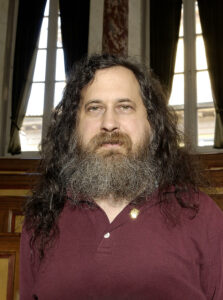What’s so great about Linux? Why do so many people get all worked up over it? I’ll try to explain.
Linux has a few different meanings. I suppose technically, Linux only refers to the kernel of an operating system. The kernel is the most basic software that deals with the computer on the hardware level. A kernel by itself isn’t useful.
There are programs developed by the GNU project that are meant to run on Unix-like systems; Linux is Unix-like system, so GNU programs can run on Linux. GNU was largely written by Richard Stallman and others. Stallman rightly says that what we call “Linux” should be referred to as GNU-Linux. While I more or less agree with him, I don’t follow this convention.
For my purposes, Linux refers to the kernel as well as the GNU programs, and a myriad of other programs.
Linux was actually a project begun by a computer science student named Linus Torvalds. He wanted some kind of kernel he could run on his personal computer.

GNU was started by Stallman because he felt that software should not be hampered by restrictive licenses.
An unsavory fact about software is that in general, you don’t buy software; you buy a license that allows you to use the software. Many of these licenses – most of them – forbid you from making copies of the software, from modifying it, from examining it to learn how it was created, etc. If you have two computers, you have to have two copies of the software, and so on.

Stallman felt this was highly immoral, so he set about writing all the software that would do the same things existing software did, but that would come with a non-restrictive license. This is called the GNU General Public License (GPL). Briefly this license allows you to do anything you want with the software, including making copies and modifying it. The only restriction is that if you give away or sell the software (even if you’ve modified it), you must give the user the same rights you have.
Linux also had the GPL, so the result was an entire operating system that, while performing substantially the same tasks of other operating systems, had no restrictive licenses. Some businesses were horrified.
Microsoft in particular tried to squelch this trend, sometimes by dirty tricks. Among the most infamous were the Halloween Papers. Ultimately these machinations were unsuccessful, and Linux is still flourishing.
